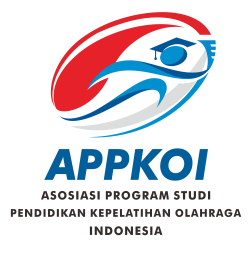Development of Game-Based Karate Basic Technique Activities at Dojo Parulian 2 Medan
DOI:
https://doi.org/10.31599/b25csj74Keywords:
Basic Karate Techniques, Games, Dojo Parulian 2 MedanAbstract
This study aims to develop game-based karate movement activities that can increase the effectiveness of training and active participation of Dojo Parulian 2 Medan members categorized as elementary schools aged 6 to 12 years. This research uses the Research and Development (R&D) research method developed by Sugiyono. With eight stages, namely potential and problems, collecting data, product design, design validation, design revision, product trial, product revision, trial use. This research was conducted at dojo Parulian 2 Medan with a small scale trial of 10 people and a large scale trial of 15 people. Based on the results of data analysis, it shows that the product quality assessment "Development of game-based karate movement activities in dojo parulian 2 medan" from the initial stage to the final stage is included in the "very feasible" criteria. The results of the analysis of the use trial to students stated "Very Feasible" with the results of a small scale trial with a score of 83.33% and a large scale trial with a score of 88.54%. From the results of the usage trial assessment, it can be concluded that the development of game-based karate motion activities at the Parulian 2 Medan dojo is categorized as "Very Feasible" and researchers can produce products for the implementation of game-based karate motion activity development.
Downloads
References
Adi Prastyo Kurniawan, S. C. Y. H. (2016). Application of Learning Model with Alfabeta. Application. Kencana Prenada media Group. Jakarta
Arikunto, Suharsimi. (2006). Scientific Research Procedures An Approach. Practice. Jakarta: Rineka Cipta.
Bandura, A. (1986). Social foundations of Thought and Action: A Social Cognitive Theory. Prentice Hall, Englewood Cliffs, NJ.
Christian, D., Veiesteinas, A., Limonte, E., Maggioni, A. M., & Aschierie, P. (2009). Energetics of karate (kata and kumite techniques) in top-level athletes.
Csikszentmihalyi, M. (1990). Flow: The Psychology of Optimal Experience. Harper & Row, New York.
Damanik, Suryadi. (2015). Recreational Sports Principles and Applications. Medan:
David, Fred R. (2009). Strategic Management Concept, Book 1. Publisher of Salemba Empat. Jakarta.
Domholdt, Elizabeth (2012). Physical Therapy Research (2nd ed.). Philadelphia: Saunders.
Durkheim, Emile. (1897). Suicide: A Study in Sociology. New York: Harper & Row.
Gunawan A. G (2007). KARTE SCIENCE Volume 1. Jakarta: PT Bumi Aksara.
Harsono. (2018). Physical Condition Training for Active Healthy Athletes. Bandung: PT. Remaja Rosdakarya.
Latif, Mukhtar, et al. 2013. New Orientations in Early Childhood Education: Theory and
Maidar G, (2017). Physical Fitness and Health. Jakarta: Raja Grafindo
Nakayama, M (2010). Best Karate Comprehensive; Translation; Bambang Oriyanto; Jakarta: The Inkai Laboratory Module.
Nishiyama, H., & Brown, C. R. (2000). Karate the art of emfety-hand fighting. United States of America.
Pangondian Hotliber Purba, 2016, Karate, Noer Fikri Offset, Palembang.
Purwanto, Sugeng. (2009). Development of karate sport achievement. Yogyakarta: Journal of sport science and technology, Vol. 11, No. 2, May 2009, pp.171-181, UNY.
Sitompul, V. (2019). Development of Traditional Gobak Sodor Square Ball Game to Improve Students' Physical Fitness. Thesis. State University of Medan.
Sudjana, Nana. 2005. Basics of the Teaching and Learning Process. Bandung: Sinar Baru Algesindo.
Sugiyono. (2017). Quantitative, Qualitative, and R&D Research Methods. Bandung:
Sujiono, Yuliani Nuraini et al. 2006. Cognitive Development Methods. University
Sujoto, J.B. 1996. Oyama Karate Techniques Kihon Series. Jakarta: PT Elex Media Komputindo
Wahjoedi, (2002) physical condition training. Bandung: PT Remaja Rosdakarya.
Downloads
Published
Issue
Section
License
Copyright (c) 2024 Mahmuddin, Ade Ros Riza, Muhammad Ishak, Argubi Silwan

This work is licensed under a Creative Commons Attribution 4.0 International License.






.png)







